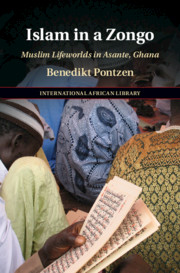Book contents
- Islam in a Zongo
- The International African Library
- Islam in a Zongo
- Copyright page
- Dedication
- Contents
- Figures
- Acknowledgements
- A note on style
- Glossary
- Introduction
- 1 A history of Muslim presence in Asante
- 2 Muslim presence and zongos in Asante
- 3 Those who pray together
- 4 Speaking for Islam
- 5 ‘Bōkā’
- Conclusion
- Appendix
- References
- Other sources
- Index
- Titles in the Series
4 - Speaking for Islam
ʿIlm and religious authority
Published online by Cambridge University Press: 08 January 2021
- Islam in a Zongo
- The International African Library
- Islam in a Zongo
- Copyright page
- Dedication
- Contents
- Figures
- Acknowledgements
- A note on style
- Glossary
- Introduction
- 1 A history of Muslim presence in Asante
- 2 Muslim presence and zongos in Asante
- 3 Those who pray together
- 4 Speaking for Islam
- 5 ‘Bōkā’
- Conclusion
- Appendix
- References
- Other sources
- Index
- Titles in the Series
Summary
Chapter 4 introduces the diverse Islamic epistemes and knowledges encountered in the zongos and discusses how these inform the assertion and contestation of religious authority in these wards. Offering an ethnography of the diverse Islamic knowledge practices and discourses in the zongos and portraying different Islamic scholars, I discuss the diversity of their ʿilm in relation to the literature of an anthropology of knowledge. Through portrayals of three Islamic scholars from Kokote Zongo, with their diverse biographies of Islamic learning, I highlight the irreducible diversity of Islamic knowledges and epistemes encountered among them. This applies especially to their salient distinctions and contestations of an exoteric and an esoteric Islamic knowledge. These different knowledges are transmitted in distinct ways and through a variety of institutions, adding to the lived diversity of this religion. In turn, the Islamic scholars deploy and challenge their distinct knowledges in their sermons and counselling and thus not only engage with but propel the lived diversity of their religion. As I argue in this chapter, ʿilm is not a pregiven Islamic knowledge but a varied and contested field on which various actors seek to assert their religious authority as they engage with and (re)make the discursive tradition of Islam.
Keywords
- Type
- Chapter
- Information
- Islam in a ZongoMuslim Lifeworlds in Asante, Ghana, pp. 131 - 176Publisher: Cambridge University PressPrint publication year: 2021

